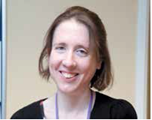JING Alumni interview: Harriet Walter, Leicester ECMC
04 Apr 2024
 Continuing our series of interviews with the JING alumni, this month we caught up with Associate Professor, Dr Harriet Walter, co-Lead at Leicester ECMC. She spoke about her career and involvement in the ECMC Junior Investigator Network Group (JING).
Continuing our series of interviews with the JING alumni, this month we caught up with Associate Professor, Dr Harriet Walter, co-Lead at Leicester ECMC. She spoke about her career and involvement in the ECMC Junior Investigator Network Group (JING).
Can you give us a brief summary of your career?
I studied medicine at the University of Birmingham, graduating with honours in 2006. During my undergraduate studies I developed an interest in medical oncology and knew this was my preferred speciality. Following completion of foundation training in the West Midlands Deanery and core medical training in the Oxford Deanery, I began my specialist training in medical oncology in the East Midlands in 2010. During my training I undertook a PhD with Professor Dyer, developing my interest in early phase trials and lymphoid malignancies. During my final year of my PhD, I applied for and was successful in my application for a Cancer Research UK Clinical Trials Fellowship, spending a further 3 years out of programme. During this time, I was fortunate to be able to spend some time at Southampton Cancer Research UK Clinical Trials Unit with Profs Griffiths and Davies. I then transitioned to my current role as Associate Professor of Medical Oncology and Honorary Consultant in Medical Oncology at The University of Leicester. Following the retirement of Prof Thomas last year, I have taken on my current role as clinical lead for the Leicester ECMC, joining Prof Karen Brown as our translational lead, and Director of the Hope Cancer Trials Centre. I continue to work a day a week for the Cancer Research UK Centre for Drug Development.
You were on the JING steering committee and Chair of the committee for 3 years, what did you gain from that experience?
It was an amazing opportunity as a trainee to be part of the ECMC network and as a collective have the opportunity to shape training opportunities and highlight the opportunities that exist due to the ECMC network. It made me recognise how diverse the skillset is across the network and the collaborative work that takes place. The breadth of representation from clinical to translational researchers on the committee as well as of course working with the fantastic ECMC programme office whom seemed to always make the event happen and run meticulously was a real highlight, a good many of whom I remain in contact with.
You regularly attend the JING: Training the Next Generation event as a member of Faculty, what do you get from the event?
I have had the opportunity to experience JING as an attendee, then subsequently in the capacity as a steering committee member and now as a faculty member. It is wonderful to see how much this event has evolved and adapted with new ideas and initiatives each year, literally going from strength to strength. With strict curriculum requirements and rota schedules, it can be difficult to secure dedicated time with trainees for training and bring together the wealth of expertise and skills within the ECMC network in one room and JING uniquely achieves this.
For myself, I feel very privileged to meet new trainees each year from such diverse clinical and translational research training backgrounds, hear and discuss their research proposals and learn from them as well as provide guidance and general career advice. It is always exciting to see how their proposals progress and learn of their successes in subsequent years. I am looking forward to hearing how the year long pilot runs. It is also a wonderful opportunity for the faculty members to have the rare opportunity to catch up in person!
What’s the best piece of advice you’ve received in your career so far?
I think there are two pieces of advice that I will always carry with me. The first is that there is no ‘correct path’ and the second is use opportunities like JING to build your own networks and actively seek out collaboration opportunities. By this I mean that opportunities may present in multiple forms and I would encourage any trainee to take every opportunity available to them even if this is a new path. Don’t be afraid to reach out to peers or those in more senior positions, whether that is for career advice or to discuss research ideas.
What advice would you give to the 2024 JING Cohort?
You can never have too many mentors or people that inspire you. There are so many ways to be involved in activities within the ECMC network and I would encourage anyone to do this.
